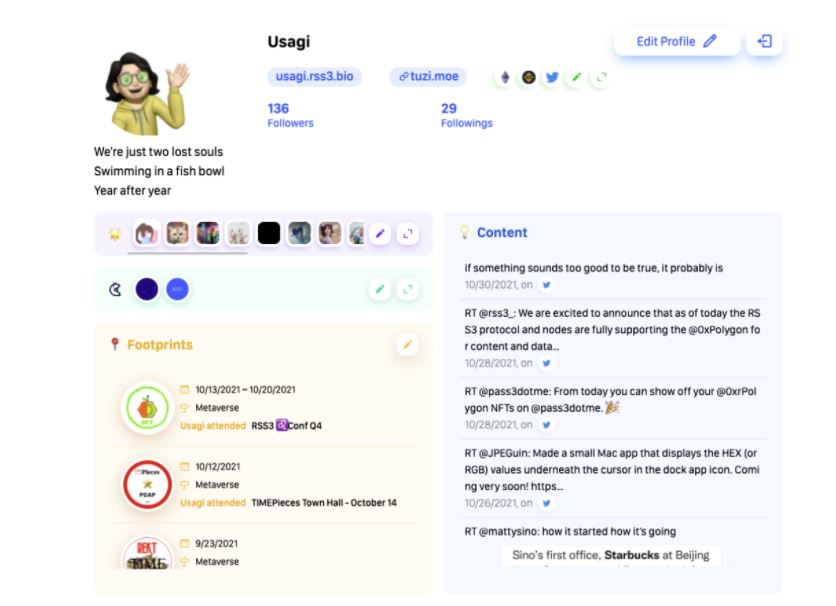Decentralization has been revolutionizing every sector and this is especially the case for the internet and how users interact with it. Centralized governing agencies control a major chunk of information on the internet currently. This includes creating, disseminating, and distributing information and also making profits from it.
RSS3 is an open protocol platform that is designed in a way that content, social networks, and other feed in Web 3.0 are decentralized and open for everyone. Users get a chance to exercise complete control over their data and information and choosing to monetize it in the way they choose.
What is RSS3?
RSS3 is the feed-in Web3.0 and is a lighter, simpler, and more powerful open protocol derived from RSS (Really Simple Syndication). It has been designed for
assets, content, social networks, and other types of feed on Web 3.0. RSS3 hosting is a peer-to-peer system that serves the RSS3 protocol and has a node, user, and a third-party application.
Developers and users get a chance to build third-party applications with a simple UI on distributed nodes that can be desktop or mobile apps, browser extensions, and much more.
RSS3 aims to give the right to create, disseminate and distribute data and information to the users instead of any centralized governing body.
Major characteristics of RSS3
Some of the major characteristics of RSS3 are:
- Distributing control: In order to truly distribute control, every user has to have control over their own data. This includes indexing files and content file under distributed hosting and editing files that are determined by their key pairs such as in Ethereum and Bitcoin.
- Open-source: RSS3 project and all its protocols are open-source meaning that their code would be made available for everyone to review. This creates a transparent system wherein users do not have to trust centralized platforms blindly.
- Inclusivity: RSS3 and its applications are aiming to be inclusive by modules be it hosting, indexing or monetizing. It is designed to be inclusive of modules with different functionalities. This opens up RSS3 in a flexible manner for varied possibilities.
- Democratic governance: True decentralization includes making users a part of the governance system. RSS3 intends to do this by bringing a democratic system that would give users a chance to have a say in the governance of the platform.
- Neutrality: RSS3 is building a protocol that does not show any bias towards any particular applications in order to be completely neutral.
A cross-network aggregator
RSS3 is adding verification and indexing modules to its protocol and becoming an indexer for every persona or user on the internet. For now RSS3Hub and later on the RSS3 nodes, users will verify the ownership of any specific accounts and then index the assets from verified accounts into the RSS3 files.
This does not only refer to decentralized networks but also the centralized ones that exist currently. The RSS3Account and RSS3Asset would be integrated into the RSS3 Standard while RSS3Hub will also be experimenting with the new modules with the introduction of the Web3 Pass.
Web3 Pass: Your Web3 Passport
The platform has recently developed an advanced RSS3 protocol that would give users a chance to show off their cyber assets. Users can show their NFTs, donations in Gitcoin, footprints and content from Mirror, Twitter and MissKey. With Web3 Pass developers and users will get a chance to do more on the platform.
For now, users can start their RSS-based Web3 with their existing Ethereum/BSC/Polygon address and get onboard the Web3 metaverse.
Just several simple steps you could completed the Web3 Pass account registration: 1, Switch to Ropsten testnet from your MetaMask extension.
2, Go to https://rss3.bio and click on “MetaMask”.
3, Connect your wallet with MetaMask
Or you could get it by another way. If you have an ENS account already, you could get an account in Web3 Pass directly after clicking in rss3.bio and linking your wallet address. It’s quite amazing.
Final word
RSS3 is building a platform where information would flow freely in a secure, efficient, and distributed manner. It aims to create a future where cyber personas or users will have complete control over the data they produce without being censored by any centralized agency.
By adopting RSS3, media platforms will have a unified group of subscribers with a monetization channel that works without commissions. Web3 Pass is based on the RSS3 protocol and as it is open-source developers get a chance to work on it freely without any hassle.
For more information on RSS3 please check out their official website.
Disclaimer: This is a paid post and should not be treated as news/advice.


